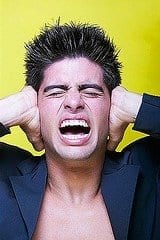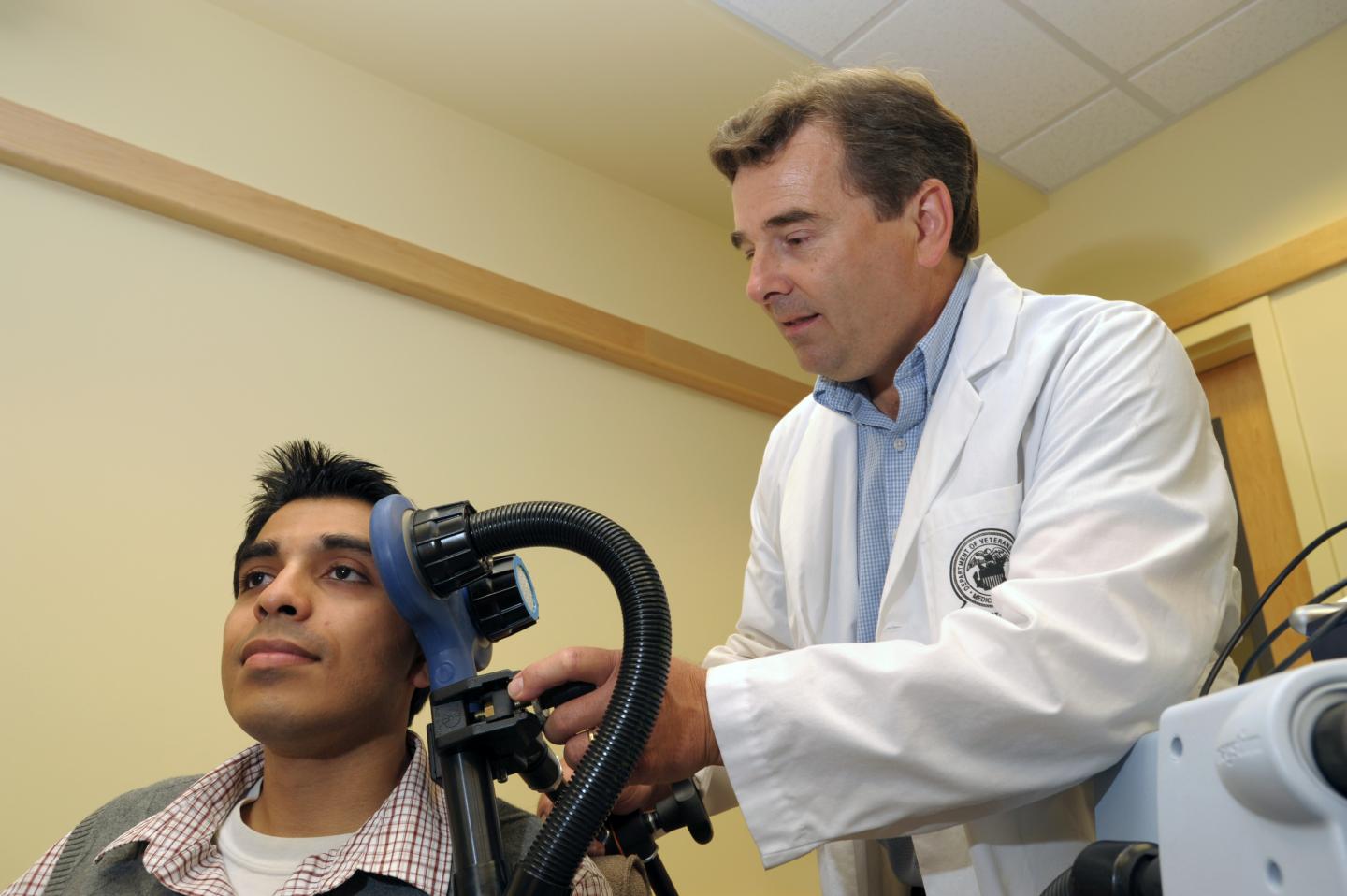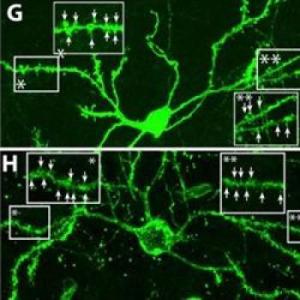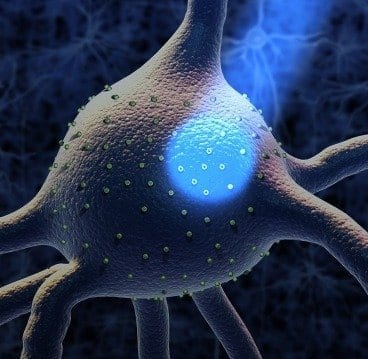
“There is no cure for it, and current therapies such as hearing aids don’t provide relief for many patients”
An epilepsy drug shows promise in an animal model at preventing tinnitus from developing after exposure to loud noise, according to a new study by researchers at the University of Pittsburgh School of Medicine. The findings, reported this week in the early online version of the Proceedings of the National Academy of Sciences, reveal for the first time the reason the chronic and sometimes debilitating condition occurs.
An estimated 5 to 15 percent of Americans hear whistling, clicking, roaring and other phantom sounds of tinnitus, which typically is induced by exposure to very loud noise, said senior investigator Thanos Tzounopoulos, Ph.D., associate professor and member of the auditory research group in the Department of Otolaryngology, Pitt School of Medicine.
“There is no cure for it, and current therapies such as hearing aids don’t provide relief for many patients,” he said. “We hope that by identifying the underlying cause, we can develop effective interventions.”
The team focused on an area of the brain that is home to an important auditory center called the dorsal cochlear nucleus (DCN). From previous research in a mouse model, they knew that tinnitus is associated with hyperactivity of DCN cells — they fire impulses even when there is no actual sound to perceive. For the new experiments, they took a close look at the biophysical properties of tiny channels, called KCNQ channels, through which potassium ions travel in and out of the cell.
“We found that mice with tinnitus have hyperactive DCN cells because of a reduction in KCNQ potassium channel activity,” Dr. Tzounopoulos said. “These KCNQ channels act as effective “brakes” that reduce excitability or activity of neuronal cells.”
In the model, sedated mice are exposed in one ear to a 116-decibel sound, about the loudness of an ambulance siren, for 45 minutes, which was shown in previous work to lead to the development of tinnitus in 50 percent of exposed mice. Dr. Tzounopoulos and his team tested whether an FDA-approved epilepsy drug called retigabine, which specifically enhances KCNQ channel activity, could prevent the development of tinnitus. Thirty minutes into the noise exposure and twice daily for the next five days, half of the exposed group was given injections of retigabine.
Seven days after noise exposure, the team determined whether the mice had developed tinnitus by conducting startle experiments, in which a continuous, 70 dB tone is played for a period, then stopped briefly and then resumed before being interrupted with a much louder pulse. Mice with normal hearing perceive the gap in sounds and are aware something had changed, so they are less startled by the loud pulse than mice with tinnitus, which hear phantom noise that masks the moment of silence in between the background tones.
The researchers found that mice that were treated with retigabine immediately after noise exposure did not develop tinnitus. Consistent with previous studies, 50 percent of noise-exposed mice that were not treated with the drug exhibited behavioral signs of the condition.
“This is an important finding that links the biophysical properties of a potassium channel with the perception of a phantom sound,” Dr. Tzounopoulos said. “Tinnitus is a channelopathy, and these KCNQ channels represent a novel target for developing drugs that block the induction of tinnitus in humans.”
The Latest Bing News on:
Noise-induced tinnitus
- Device to end misery of tinnituson May 6, 2024 at 4:59 pm
Scientists have discovered that white noise may help to get rid of the debilitating ringing sound of tinnitus, a distressing condition which affects one in ten people in Britain at some point in ...
- Do hearing aids cause tinnitus?on May 6, 2024 at 10:43 am
Let's cut to the chase: No, hearing aids in now way cause tinnitus. In fact, hearing aids are often prescribed as a form of treatment for tinnitus, which sometimes presents alongside hearing loss.
- 'I was shocked when doctor told me this was the surprising cause of my tinnitus'on May 3, 2024 at 5:38 am
At night when there was little other noise about, I became really aware ... “My GP said it sounded like a classic case of tinnitus, and that it can be closely linked to stress, which was ...
- Tinnitus Is Common in Children With and Without Hearing Impairmenton April 19, 2024 at 4:59 pm
In 2006, researchers in Gothenburg, Sweden, surveyed 756 children undergoing standard audiometric screening about whether they experienced noise-induced or spontaneous tinnitus (ringing ...
- Can headphones cause tinnitus? Here’s what you should knowon April 17, 2024 at 5:00 pm
Noise-induced hearing loss is actually the leading cause of tinnitus today according to Alecia Steen and Marcus Lux of Prime Sound, which can come from loud noises in the workplace just as much as ...
- Understanding tinnitus triggerson April 14, 2024 at 5:00 pm
Tinnitus is the perception of sound, typically in the absence of any objective, external noise. People often describe it as a ringing noise in the ears. For some individuals, tinnitus may start or ...
- 'I've had tinnitus for over 10 years - here are my top 5 tips for living with the noise'on April 14, 2024 at 3:08 am
around 7.6 million people have tinnitus in the UK, that’s a large proportion of the population with a constant noise in their ears. This means if you Google ‘Famous people with tinnitus ...
- Temporary tinnitus: Causes and tips to prevent iton April 9, 2024 at 5:00 pm
Temporary tinnitus causes short-term sounds in the ears, such as ringing, buzzing, or hissing. Potential causes include exposure to loud noise, earwax or other obstruction, and certain medical ...
The Latest Google Headlines on:
Noise-induced tinnitus
[google_news title=”” keyword=”noise-induced tinnitus” num_posts=”10″ blurb_length=”0″ show_thumb=”left”]
The Latest Bing News on:
Tinnitus
- Hidden Hearing Loss Linked to Tinnitus, Harvard Study Findson May 10, 2024 at 12:40 am
Tinnitus, a condition characterized by a persistent ringing or whining sound in the ears, affects between 10 to 25 percent of adults globally, according to the World Health Organization (WHO). Despite ...
- Is Turmeric Good For Tinnitus? A Review By Nutrition Professionalson May 7, 2024 at 2:28 pm
Expert opinion from Ledyan Ledyan Master's degree Medicinal plants and functional food/Bachelor's degree Nutrition · 4 years of experience · Indonesia Turmeric contains an active ingredient called ...
- Do hearing aids cause tinnitus?on May 6, 2024 at 10:43 am
Let's cut to the chase: No, hearing aids in now way cause tinnitus. In fact, hearing aids are often prescribed as a form of treatment for tinnitus, which sometimes presents alongside hearing loss.
- Dr. Marc Fagelson Talks Tinnitus And Coping With It More Accessibly In Interviewon May 3, 2024 at 10:49 am
This is when a person experiences sounds even when they understand there is zero ambient noise emanating from their environment.
- 'I was shocked when doctor told me this was the surprising cause of my tinnitus'on May 3, 2024 at 4:38 am
Adrian Monti hears about an unexpected cause of tinnitus and how the dawn chorus could help diagnose audiology issues ...
- Tinnitus - Marca Dewey, AuD, CCC-Aon May 1, 2024 at 7:45 am
Marca Dewey, AuD, CCC-A, audiologist, explains what tinnitus is, its causes and the connection between tinnitus and hearing loss. Dr. Dewey also talks about tinnitus treatment options and why you ...
- ‘Shark Tank’ hosts and actor Kevin Costner aren’t endorsing products to treat tinnituson April 30, 2024 at 7:26 am
Ads making the rounds on Facebook claim hosts of the popular ABC reality TV show “Shark Tank” and actor Kevin Costner are endorsing products aimed at treating tinnitus. Tinnitus is a common ...
- ‘Shark Tank’ hosts and actor Kevin Costner aren’t endorsing products to treat tinnituson April 30, 2024 at 7:23 am
Several readers asked whether the hosts of “Shark Tank” and other celebrities endorse products like gummies to treat tinnitus, as ads claim. Here’s what we found.
- Neuromod Devices: Lenire from Neuromod delivers tinnitus improvement 'not demonstrated for any other treatment,' according to expert consensuson April 29, 2024 at 12:09 am
Textbook of Tinnitus' is a comprehensive textbook that describes tinnitus, how it is caused, and state-of-the art interventions such as Lenire.Top-ranked tinnitus expert authors of the Textbook ...
- Lenire from Neuromod delivers tinnitus improvement 'not demonstrated for any other treatment,' according to expert consensuson April 28, 2024 at 8:02 pm
Textbook of Tinnitus' is a comprehensive textbook that describes tinnitus, how it is caused, and state-of-the art interventions such as Lenire. Top-ranked tinnitus expert authors of the Textbook of ...
The Latest Google Headlines on:
Tinnitus
[google_news title=”” keyword=”Tinnitus” num_posts=”10″ blurb_length=”0″ show_thumb=”left”]










